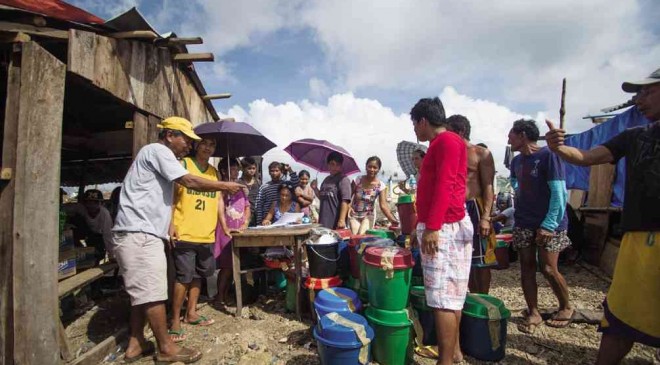
OFFICIALS in a town in Eastern Samar check lists of names of residents before handing out relief in pails following the devastation wrought by Supertyphoon “Yolanda.” RICHARD BALONGLONG/INQUIRER NORTHERN LUZON
ILOILO CITY—People in parts of Western Visayas ravaged by Supertyphoon “Yolanda” will need food aid for up to four more months as people in these areas lost not only houses but their sources of livelihood as well, according to an official helping bring aid to storm survivors for a United Nations agency.
Jose Abraham Ongkiko, Western Visayas coordinator of the Yolanda Response Program of the United Nations Development Program (UNDP), said the magnitude of the devastation required continuing food assistance, especially for farmers and fishermen who lost their means of livelihood after the storm struck.
Ongkiko told reporters in Roxas City that some areas in the region have not received relief or aid “even once.” These are mostly areas that are inaccessible because of their remoteness or the absence of road networks.
He said some nongovernment organizations helping bring aid were also prevented from doing so in remote areas because of lack of resources and time.
Long process
Even in areas that are starting to recover or where rehabilitation efforts are ongoing, continued food assistance is still needed, according to Ongkiko.
“Recovery is still a long process even if the emergency situation could be declared over by early February,” Ongkiko said.
He cited the plight of coconut farmers who may not have any means of livelihood for two years after the coconut industry was hit hard by Yolanda. In Capiz alone, more than 600,000 coconut trees were uprooted.
Ongkiko said there was a need for significant livelihood support for the storm victims.
International humanitarian organizations, which are based in Roxas City, the regional hub, have launched cash-for-work programs and provided other forms of assistance to the devastated communities.
In Western Visayas, UNDP aims to bring aid to at least 39 municipalities and more than 14,000 beneficiaries, according to Ongkiko.
The agency has so far spent P13 million on its cash-for-work program in six towns in Capiz, two towns in Iloilo and four towns in Aklan.
Minimum wage
The cash-for-work program involves mainly the clearing of debris in schools, day-care centers, rural health units, drainage canals and irrigation facilities.
Beneficiaries of the cash-for-work program are hired for 15 or 30 days and paid P287 per day, the mandated minimum wage in the region.
Ongkiko said the cash-for-work program would also be used in clearing fallen coconut trees to provide livelihood to coconut farmers.
The fallen trees will be cut and used to build houses for the survivors.
In the coming months, UNDP will also help revive the fishing industry in the devastated areas by providing assistance in the form of transportation, packaging and storage to fishermen, according to Ongkiko.